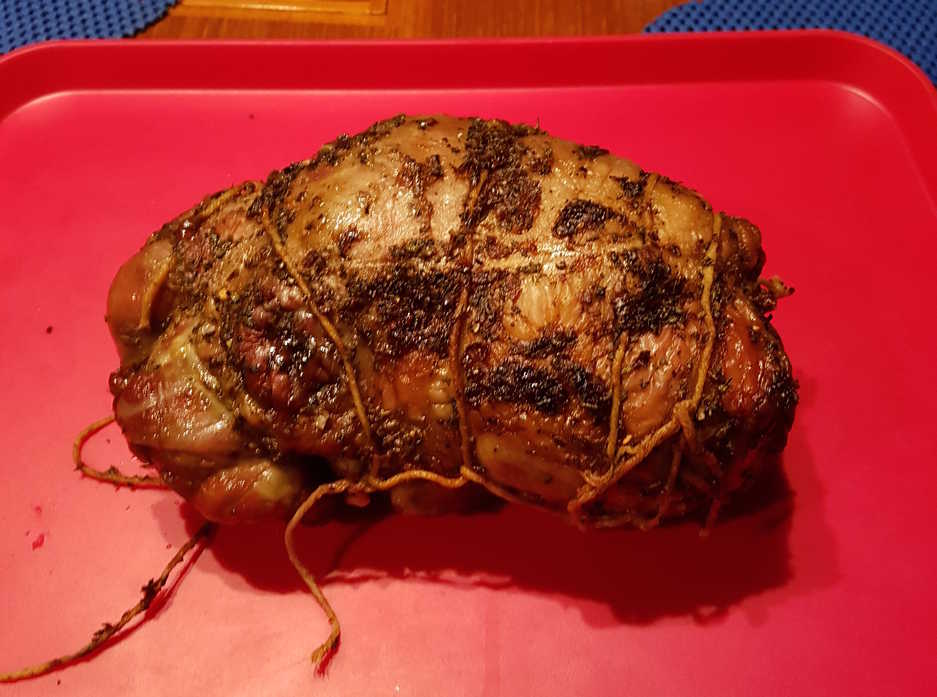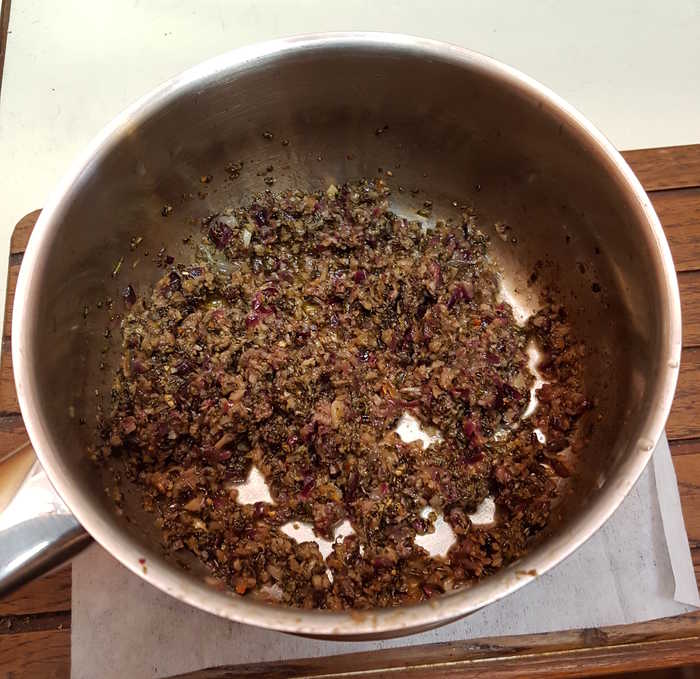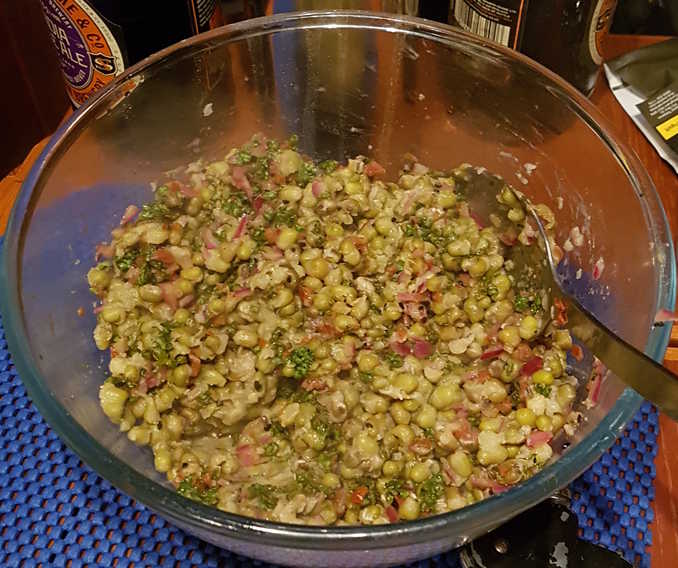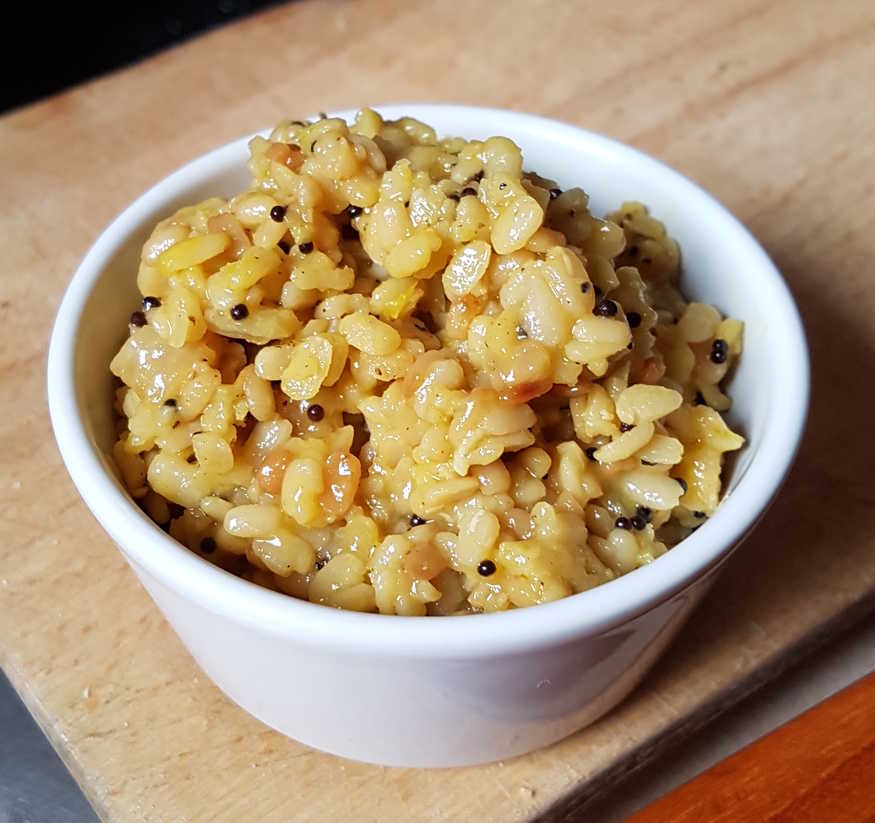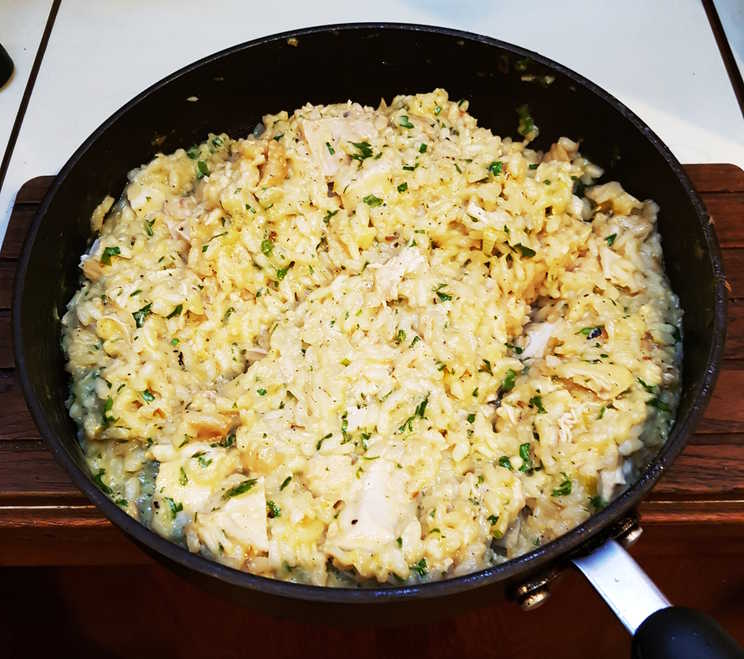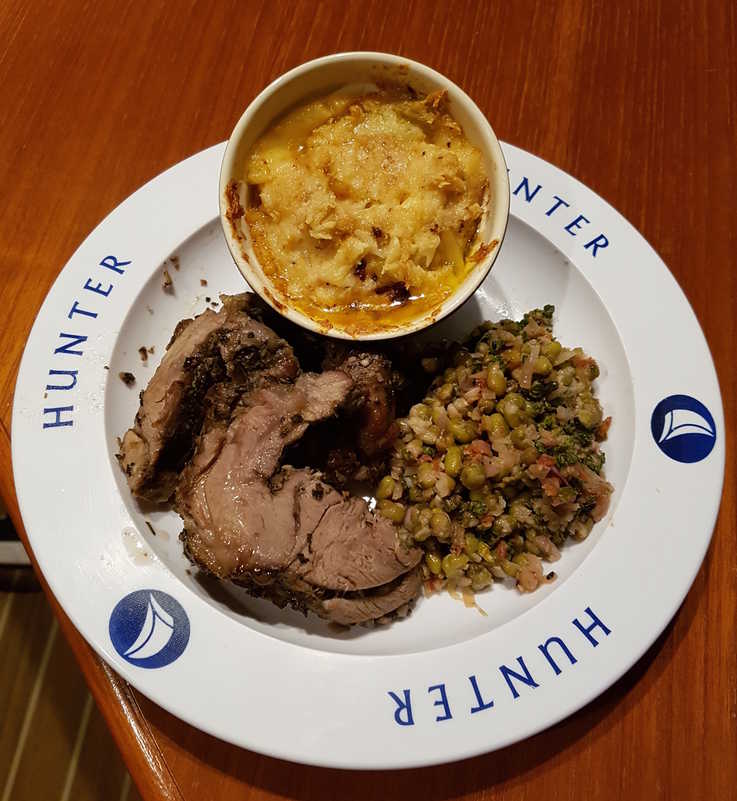
Eating for Easter

It's that time of the year when we religiously gobble the lamb of God in celebration of his sacrifice. And who am I to offend against tradition.
So I bought a leg of lamb (on offer at my Local Fucking Supermarket™) to share with two other lonely skippers from neighbouring boats (that's one of the lonely skippers lovely wooden boat above).
The other dishes were somewhat ad-hoc from the stuff I had aboard that needed eating. I got rid of some more boat beans, threw a few wilting celery stalks in with the cauliflower, and flavoured a bag of rapidly softening carrots with dried apricots leftover from a nice roast pork I once cooked for Kurt.
The meal was at least tasty enough to make one of those lonely skipper's absent girlfriend jealous. So that's a bonus :)
I recently spent some painful time listening to Sam Harris attempt a conversation with Ezra Klein on one of Sam's podcasts
(Published April 9th, 2018).
A quick bit of background - Sam previously recorded a podcast with controversial political scientist Charles Murray, author of The Bell Curve, to discuss the current state of the science of IQ, how this reflects on claims made in the Bell Curve and how Murray became a social pariah.
It's quite good and worth a listen.
Subsequent to that, a series of articles on Vox by the usual ratbag of disgruntled, race-baiting psychologists outraged at finding someone who disagrees with them given (moderately) respectable air time. They (re-)accused Murray of peddling junk science and even went so far as to pen the hilariously un-self-aware passage We are absolute supporters of free speech in general and an open marketplace of ideas on campus in particular, but...!
You can guess the rest.
After some behind the scenes tom-twittery it seems Ezra felt the need to pen his own long and rambling diatribe on the topic in which he mostly seems to be complaining that the entire history of slavery and oppression, ancient to modern, was given insufficient prominence in the podcast about IQ.
And so Sam and Ezra get to air their differences together.
Now just to be clear I happen to think that Sam Harris is a generally thin-skinned, insufferable, tedious and dogmatic windbag who is nowhere near as clever as he thinks he is, and find his pathological inability to make a simple point succinctly bores the pants of me very quickly. But I was generally predisposed to his defence in this discussion having myself read The Bell Curve and found nothing racially offensive in it.
A quick partisan summary of the final round then;
Sam Harris repeatedly attempts to make the point that it ought to be possible to talk about the science and data of IQ independently of the personality, personal politics or the social policies which Charles Murray might or might not espouse consequent to them.
Ezra Klein continually deflects this assertion with demands that any discussion touching or involving race should be accompanied by an obligatory lecture in the entire history of slavery, ancient to modern.
After hearing them verbally circling and talking past each other for two hours I felt compelled to conjure forth my intellectual tuppence in the form of two mild caricatures of Sam and Ezra called Saul and Esau:
Someone like Saul sees a black person and thinks Oh look, a human being. Let's go and bore the shit out of them.
Someone like Esau sees a black person and thinks Oh look, a victim of discrimination, slavery and oppression. Let's go and support the shit out of them.
Saul thinks that he's not a racist because he doesn't imbue every individual black person he meets with the racial characteristics that may be ascribed to their group.
Saul thinks that Esau is probably a racist because Esau is predominantly concerned with the racial group identity of every individual he meets.
(We could note here that one of the things Ezra did in preparation for his discussion with Sam was to obsessively count the number of black people Sam has guested on his podcasts.)
Esau thinks that he's not a racist because he sees the deep injustice and racism inherent in the world, and thus each black person as he truly is - victimised and oppressed.
I suspect that Esau regards Saul as being the next best thing to a racist.
Esau thinks that Saul is a racism-denier because Saul denies an assumed victimhood of individual black people.
For Esau, denying or failing to place The Black People™'s oppressive racial inheritance at the centre of any black person' identity is a borderline racist act.
(Although Ezra does deny that he considers Sam to be a racist, at one point in the podcast he also condemns Sam for being an anti-anti-racist.
[59:42].)
Saul thinks that Esau is an identitarian because Esau only views a black person as a member of The Black People™ tribe. Not as an individual.
Esau does not really see a black person separately from his membership of The Black People™, because for him every black person is a personal embodiment of the entire history of the racial oppression of The Black People™.
Esau genuinely sees the world through this racialist microscope. He simply experiences existence as one seeped in racism. Infused with racism. Racism is the inescapable and inseparable reality of his universe.
In the words of living feminist trope Anita Sarkeesian
... when you start learning about systems, everything is sexist, everything is racist, everything is homophobic, and you have to point it all out to everyone all the time.
and in Ezra's own words:
Esau doesn't see himself as indulging in social justice warriorhood because for him he isn't imposing his racialist interpretation onto the world.
The world simply is racist.
Therefore for Esau this means that anyone who doesn't see this truth is a deluded, self-deceiving denier of reality.
And probably a racist white supremacist to boot.You [Sam Harris] see, you know, on my part a social justice warrior tribalism of some sort or another someone who is, you know, looking for evidence of racism and bigotry.
I look at our society and I see a society that even now on every study we basically run shows huge, huge, huge racial bias.
[2:04:15]
For Esau it is Saul who is the tribalist, because it is Saul who belongs to a group bent on twisting and denying reality. And more than that, he doesn't regard not seeing the racism in everything as a legitimate standpoint.
I suspect that Ezra really doesn't understand Sam's term identity politics, because for him the identity of an individual genuinely isn't separable from their existence as a member of a group. He thinks that Sam must be himself playing identity politics, or being tribalist because it is obvious to him that Sam belongs to the tribe of The White People™ and for him that naturally defines Sam's identity. Indeed, at one point in the podcast he characterises Sam's own identity politics as coming from one of Sam's internal identities. As though he understands the term identity politics to refer to the policies of an internal identity to which one feels one belongs, not the act of imposing on others the identity to which one feels they ought to belong.
I was recently reminded of a revealing (and hilarious) 2017 video by Ami Horowitz supposedly reporting on a White Privilege Conference in Kansas City, Missouri in which the attendees he interviews enthusiastically agree that it is wrong to judge people collectively whilst simultaneously, and entirely un-ironically stating on camera that ... it is fair to say that all white people are racist.
This sounds like laughable cognitive dissonance to many, including me, but I think that for the truly wokeit isn't.
They are genuinely not able to separate their beliefs about groups from their beliefs about the nature of individuals.
To the woke identitarian the fact that white people are racist isn't a fact about their group at all. It's simply a statement about the nature of every white person, a statement about the nature of their existence.
And so to the podcast's charged question of the genetic, or at least inheritable, component of the IQ of identifiable groups. Say the IQ of black Americans, or the IQ of white Americans:
For Sam the question of to what extent IQ is genetic, or biologically inheritable is an empirical question that could in principle be investigated and determined independently from the question of the mechanisms by which past and ongoing racism might affect modern day group IQ.
The heritability (or not) of IQ is a different issue than the environmental, or even potential biological, effects of racism on IQ.
For Ezra I think these issues are actually inseparable. For Ezra it isn't possible to, as Sam describes it, honestly discuss data[12:15]
I'm unsure whether he thinks that this is simply impossible on a purely practical level - due to the counfounding effects of multi-generational slavery, segregation and discrimination on any study, or whether he thinks that there is something intrinsically, theoretically, impossible about separating these issues - making the very question meaningless?
I'm inclined to the latter given Ezra's avoidance of directly answering Sam's question on this point, and his repeated insistence on detouring his responses back into a discussion of the entire history of slavery.
Considering Ezra's statement that
I doubt that we have, given the experiment that we have run in this country, given the centuries of slavery and segregation and oppression ... violence ... terror ... trauma .. I absolutely doubt, I truly to the core of my being doubt, that we are at a place where any of us should have confidence saying that the differences we see in individuals now, reflect intrinsic group capacity [1:30:45]
I'm tempted to suppose that what is going through Ezra's mind here is a conviction that the history of oppression of The Black People™
has somehow intruded itself into their very DNA. Their very genetic identity.
That racist victimisation has actually become a part of their being at the very deepest level,
and that that being black is now inseparable, even biologically, from having been oppressed.
For someone who believes this to be true, it is obviously not possible to even discuss the IQ of The Black People™
without considering their oppressive history.It really isn't possible to honestly discuss data.
So finally, where do we go from here?
Sam thought he and Ezra could just discuss these issues like people who see and interpret the world in a fundamentally common way. But of course they don't. Like any meeting of a rationalist and a religionist their talking happened on completely separate planes of reality.
Just as it is impossible to convert a religious believer by logical argument, so it is impossible to rationalise an idealogue from their ideation. They do not see the world in those terms.
As a rationalist it's tempting to assume you must only demonstrate to an idealogue a few internal logical inconsistencies in their idealogical framework and they will recognise their defeat and renounce their faith. But it simply doesn't work that way, because to an idealogue, two rationally inconsistent beliefs can both be simultaneously true.
- It is possible to believe that we must, in the words of Hilary Clinton, listen to The Black People™ talk while simultaneously silencing every black person who's world view doesn't concur with yours.
- It is possible to believe that the word of God instructs us to take an eye for an eye while simultaneously averring that we should turn the other cheek.
- It is possible to believe that being skin-colour-blind is a form of racism.
- It is possible to believe that one shouldn't judge people collectively while simultaneously believing that all white people are racist.
- It is possible for facts to be racist.
Now I've heard Sam Harris expressing his opinion that there is in actuality something factually superior about the rational view of the world, which leads him to think that he can rationally demonstrate this to the unbeliever. Or rather, the believer. But I'm inclined to agree with Jordan Peterson on this.
It's not clear that rationalism is empirically superior to religiosity or identitarianism. They are all coherent and effective views of the world on their own terms, none of which make any sense to any other.
The only empiricism is in the differing real-world outcomes and consequences of these different world views.
And I have no idea where we go from there :(
Time for some chicken risotto.
Roast Rolled Leg of Lamb
meat main
Though butterflying a leg of lamb is a bit more fiddly than those YouTube chefs manage to make it look it's not over-challenging.
The advantage of a de-boned joint is a more even cooking and much easier (and prettier!) carving.
Having the stuffing distributed through the whole joint also promotes effective marinating and terrific flavour.
Having the stuffing distributed through the whole joint also promotes effective marinating and terrific flavour.
Serves 4
Ingredients
- 1 leg of lamb (around 2kg)
- 2 tablespoons extra-virgin olive oil
- 4 medium cloves garlic, minced (about 1 tablespoon)
- 1 medium shallot (or half a red onion), minced (about ½ cup)
- 6 anchovy fillets, minced (about 3 tablespoons)
- 2 tablespoons finely chopped fresh rosemary leaves
- 1 tablespoon zest from 1 lemon
- ½ teaspoon red pepper flakes
- 2 teaspoons kosher salt
- ½ teaspoon freshly ground black pepper
De-bone and butterfly the leg of lamb:
Remove the top H-bone, if present.
Next start by slicing through the flesh along the thigh bone then carefully cut and scrape the rest of the bone away and remove. You'll probably end up with a hole where the lamb's knee was.
If you prefer, separate the whole shank at the knee with its meat attached, to stew separately. Otherwise continue to cut away the shank bone and include the meat in your single piece.
There will probably be two segments that are thicker than the rest, so slice these (almost!) in half from the centre out, so you can open them like a book thus enlarging the butterfly to uniform thickness.
Adjust oven rack to lower-middle position and preheat oven to 275°F (135°C). Heat olive oil in a small saucepan over medium heat until shimmering.
Add garlic, shallot, anchovies, rosemary, lemon zest, and red pepper flakes. Cook, stirring occasionally, until shallots and garlic are softened, about 5 minutes. Transfer to a small bowl.
Add salt and pepper and mix with a fork to combine.
Rub half or most of the mixture into the inside of butterflied lamb leg. Roll the leg and tie securely at 1-inch intervals with butcher's twine. Rub the remaining mixture over the exterior of lamb. Cook immediately or let rest uncovered or wrapped in clingfilm if that isn't practical in the refrigerator for up to one night for best flavor and texture.
When ready to cook, place the lamb on a wire rack set in a foil-lined rimmed baking sheet moistened with a few tablespoons of water (to prevent the dripping juices from burning). Transfer to the oven and roast until an instant read thermometer inserted into coolest section of the lamb registers 125° to 130°F (50-55°C) for medium-rare, or 130° to 135°F (55-60°C) for medium; 3 to 3½ hours.
Remove from oven and let rest for 40 minutes.
While the lamb is resting, increase the oven temperature to 500°F (260°C).
Return the lamb to the oven and roast until its exterior is deep brown and crisp, about 15 minutes. Remove from the oven and let rest for 5 minutes. Remove the twine with kitchen shears, transfer the lamb to a cutting board, slice into ¼ inch slices, and serve.
Remove the top H-bone, if present.
Next start by slicing through the flesh along the thigh bone then carefully cut and scrape the rest of the bone away and remove. You'll probably end up with a hole where the lamb's knee was.
If you prefer, separate the whole shank at the knee with its meat attached, to stew separately. Otherwise continue to cut away the shank bone and include the meat in your single piece.
This does make your roll a bit more messy, and theoretically the shank meat will benefit from a much longer, slower cooking than the rest of the leg,
but possibly like me you won't want to start a collection of shanks to freeze for a stew.
Online you'll find many videos showing how to butterfly your lamb's leg, all of them slightly different. Some start cutting on the knee-side of the leg and find a natural seam to open, others cut in half the thick flank steak opposite the knee and work out from there.
Pay your money and make your choice.
Next lay the de-boned meat opened flat, skin side down.Online you'll find many videos showing how to butterfly your lamb's leg, all of them slightly different. Some start cutting on the knee-side of the leg and find a natural seam to open, others cut in half the thick flank steak opposite the knee and work out from there.
Pay your money and make your choice.
There will probably be two segments that are thicker than the rest, so slice these (almost!) in half from the centre out, so you can open them like a book thus enlarging the butterfly to uniform thickness.
Adjust oven rack to lower-middle position and preheat oven to 275°F (135°C). Heat olive oil in a small saucepan over medium heat until shimmering.
Add garlic, shallot, anchovies, rosemary, lemon zest, and red pepper flakes. Cook, stirring occasionally, until shallots and garlic are softened, about 5 minutes. Transfer to a small bowl.
Add salt and pepper and mix with a fork to combine.
Rub half or most of the mixture into the inside of butterflied lamb leg. Roll the leg and tie securely at 1-inch intervals with butcher's twine. Rub the remaining mixture over the exterior of lamb. Cook immediately or let rest uncovered or wrapped in clingfilm if that isn't practical in the refrigerator for up to one night for best flavor and texture.
When ready to cook, place the lamb on a wire rack set in a foil-lined rimmed baking sheet moistened with a few tablespoons of water (to prevent the dripping juices from burning). Transfer to the oven and roast until an instant read thermometer inserted into coolest section of the lamb registers 125° to 130°F (50-55°C) for medium-rare, or 130° to 135°F (55-60°C) for medium; 3 to 3½ hours.
Remove from oven and let rest for 40 minutes.
While the lamb is resting, increase the oven temperature to 500°F (260°C).
Return the lamb to the oven and roast until its exterior is deep brown and crisp, about 15 minutes. Remove from the oven and let rest for 5 minutes. Remove the twine with kitchen shears, transfer the lamb to a cutting board, slice into ¼ inch slices, and serve.
Most Excellent.
Hot Mung Bean Salad
veg vegan stew side
Pressed for time (and pans) I skipped the fried onions in this
Happy Foodie recipe
(and correspondingly halved the oil).
The result was really very good without.
I did add 1 tsp of onion (nigella) seeds but I think they might have worked better with the onion, so feel free to skip them too.
The result was really very good without.
I did add 1 tsp of onion (nigella) seeds but I think they might have worked better with the onion, so feel free to skip them too.
Serves 6
Ingredients
- 250g dried mung beans, soaked overnight
- 3 large onions, finely sliced or not
- 8 tbsp olive oil or 4
- 3 tbsp red wine vinegar
- ½ tsp mild mustard
- ½ a large bunch of fresh parsley, finely chopped
- 4 shallots, chopped finely
- 8 sun-dried tomatoes, finely chopped
- 1 tbsp capers, roughly chopped
- 1 tbsp nigella seeds or not
Drain the mung beans, place in a saucepan and cover with cold water.
Bring to the boil then reduce to a simmer and cook the beans for 15-30 minutes, until they are soft. Remove from the heat, and drain.
Meanwhile, heat half the olive oil in a large saucepan on a low heat and sauté the onions for 20-25 minutes, until they are soft and lightly golden.
Combine the rest of the olive oil, red wine vinegar, mustard, parsley and shallots in a bowl, and season. Add the warm mung beans and toss in the tomatoes. Finally, top with the cooked onions.
Serve hot or cold, sprinkled with nigella seeds.
Meanwhile, heat half the olive oil in a large saucepan on a low heat and sauté the onions for 20-25 minutes, until they are soft and lightly golden.
Combine the rest of the olive oil, red wine vinegar, mustard, parsley and shallots in a bowl, and season. Add the warm mung beans and toss in the tomatoes. Finally, top with the cooked onions.
Serve hot or cold, sprinkled with nigella seeds.
Very tasty served hot(ish).
Cauliflower and Celery Cheese
veg side cheese
I had a few leftover celery stalks that needed eating so I thought I'd incorporate them into a cauliflower cheese.
The result, I feel, was perfectly acceptable. If no particular improvement on the original.
The result, I feel, was perfectly acceptable. If no particular improvement on the original.
Serves 4
Ingredients
- 1 cauliflower, separated into florets
- half a dozen celery stalks, sliced
- 1 litre milk or a little less
- 75g butter
- 50g plain flour
- 150g cheese, grated cheddar works
- a glass of Ricard
- 50ml double cream
- salt & pepper
Melt 25g of butter in a saucepan, throw in the cauliflower florets and brown quickly over high heat, throw in the chopped celery and deglaze with Ricard.
Cover and steam over very low heat until tender. Decant into a baking dish and set aside.
Meanwhile melt 50g of butter in another saucepan, add the flour and cook until it smells biscuity, then add the milk a little at a time, whisking constantly. Leave the smooth sauce to simmer over a low heat for 10 minutes. Add the grated cheese and stir until it melts. Add the cream and season.
Pour the sauce over the cauliflower and celery in the baking dish and grill or bake until nice and bubbly.
Meanwhile melt 50g of butter in another saucepan, add the flour and cook until it smells biscuity, then add the milk a little at a time, whisking constantly. Leave the smooth sauce to simmer over a low heat for 10 minutes. Add the grated cheese and stir until it melts. Add the cream and season.
Pour the sauce over the cauliflower and celery in the baking dish and grill or bake until nice and bubbly.
You can grate extra cheese on top before baking.
A crispy breadcrumb topping (fresh breadcrumbs fried in butter and scattered on top) might be nice too.
Urid/Urad Bean Stew
veg staple stew
A non-curry version of urad (aka urid aka black gram) dal.
This makes a good absorbent substitute for rice or potato if you don't have any rice or potato and you don't make it too thin.
This makes a good absorbent substitute for rice or potato if you don't have any rice or potato and you don't make it too thin.
Serves 4
Ingredients
- 2 tsps black mustard seeds
- olive oil
- butter
- 1 onion, chopped
- 4 cloves garlic, sliced
- 2 cups split urad
- 1 lemon, juiced or orange works well too
- salt
Heat olive oil in a saucepan and fry the mustard seeds until they sizzle,
add roughly chopped onion and fry until beginning to caramelise at the edges.
Add sliced garlic and stir through.
Add the urid and stir through.
Add lemon or orange juice, and enough water to barely cover, put on the lid and simmer until soft and creamy (perhaps 30 minutes).
Add more water as necessary.
Stir in a knob of butter, season, serve.
Stir in a knob of butter, season, serve.
Not too bad, possibly even better with the orange juice, which seems to suit the bean flavour better.
Carrots with Apricot
side veg
Whenever I buy a bag of dried(ish) apricots I always struggle to get rid the rest
after using the dozen I bought it for.
This recipe can help.
This recipe can help.
Ingredients
- carrots, matchsticked
- dried apricots, sliced
- red onion, sliced
- butter, a generous amount
- mixed colour peppercorns, crushed
- salt
Cut your carrots into matchsticks and slice the red onion and dried apricots (I used those moist kind of dried apricots).
Melt a golf-ball sized knob of butter in a saucepan, throw in everything else, add a generous grinding of mixed-colour peppercorns, a little salt, cover tightly, and sweat over a low heat until meltingly soft. Add a little water if the contents become too dry.
Serve dressed with chopped parsley.
Melt a golf-ball sized knob of butter in a saucepan, throw in everything else, add a generous grinding of mixed-colour peppercorns, a little salt, cover tightly, and sweat over a low heat until meltingly soft. Add a little water if the contents become too dry.
Serve dressed with chopped parsley.
Surprisingly good.
Chicken, Lemon and Parsley Risotto Recipe
fowl main
I heard about Diana Henry on one of James Delingpole's podcasts
- seems she's one of his favourite cookery writers.
So I thought I should check her out - a man as solid as Delingpole on climate science must know his eggs too.
Turns out she also knows her eggs. Or in this case, her rice.
Turns out she also knows her eggs. Or in this case, her rice.
Serves 4
Ingredients
- 1.5 litres (2½ pints) chicken or vegetable stock
- 1 tbsp olive oil
- 75g (3oz) butter
- 1 medium onion, finely chopped
- or
- 1 leek, finely chopped
- 300g (10½oz) risotto rice
- finely grated zest and juice of ½ unwaxed lemon
- 250g (9oz) leftover chicken, cut or torn into chunks
- 2 egg yolks
- 2-4 tbsp finely chopped flat-leaf parsley
- 5 tbsp grated parmesan, or a mature cheddar plus extra to serve
- 4 tbsp double cream
- salt & pepper
First catch your chicken. Roast à la Hopkinson,
reserving some of the cooking juices, and saving the breasts for the risotto.
Use the carcass to make up a light chicken stock,
supplemented with the cooking juices as desired.
Heat the stock to a simmer and keep it simmering.
Finely chop the onion or the leek, or a mixture of both, heat the olive oil and half of the butter in a heavy pan and add. Cook on a medium heat until soft but not coloured. Add the rice and stir it in the fat and juices until it is translucent.
Start to add the stock, a ladleful at a time, stirring continuously. Don’t add any new stock until the last lot has been absorbed. After 20 minutes the rice should have softened but retained just the faintest hint of bite in the middle. Two thirds of the way through the cooking time stir in the lemon zest, and five minutes before the end add the chicken to warm through.
In a bowl mix the lemon juice with the yolk, parsley, parmesan, cream, salt and pepper. Take the risotto off the heat, add the lemon juice mix and the rest of the butter and stir gently. Taste. Cover and leave to rest for two minutes then serve with extra grated parmesan.
Heat the stock to a simmer and keep it simmering.
Finely chop the onion or the leek, or a mixture of both, heat the olive oil and half of the butter in a heavy pan and add. Cook on a medium heat until soft but not coloured. Add the rice and stir it in the fat and juices until it is translucent.
Start to add the stock, a ladleful at a time, stirring continuously. Don’t add any new stock until the last lot has been absorbed. After 20 minutes the rice should have softened but retained just the faintest hint of bite in the middle. Two thirds of the way through the cooking time stir in the lemon zest, and five minutes before the end add the chicken to warm through.
In a bowl mix the lemon juice with the yolk, parsley, parmesan, cream, salt and pepper. Take the risotto off the heat, add the lemon juice mix and the rest of the butter and stir gently. Taste. Cover and leave to rest for two minutes then serve with extra grated parmesan.
Lovely.
Diana suggests that if you inexplicably prefer a less rich version leave out the egg yolk, cream, or both.
Diana suggests that if you inexplicably prefer a less rich version leave out the egg yolk, cream, or both.
